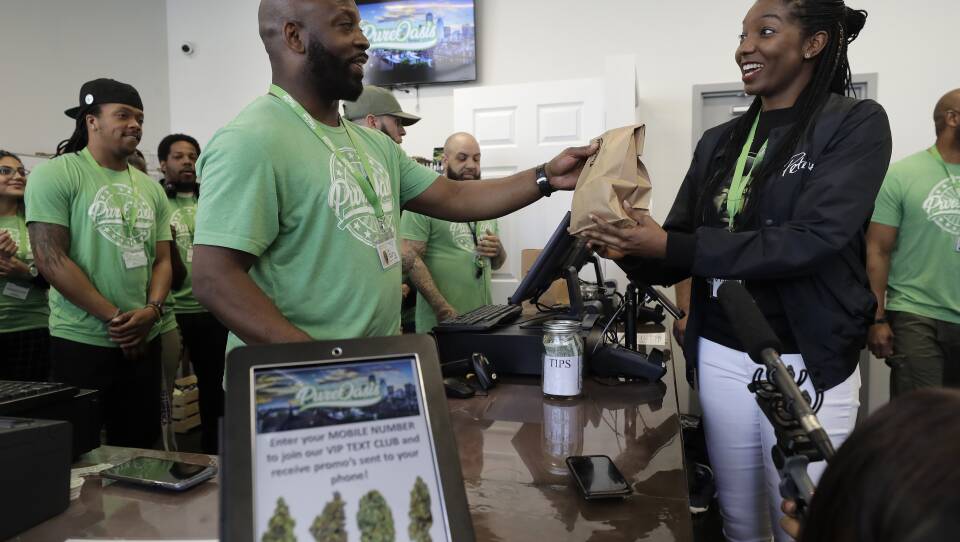After a six-month wait, the Department of Justice finally responded to Sen. Elizabeth Warren and Sen. Cory Booker’s letter to the White House asking President Joe Biden’s administration to effectively decriminalize marijuana and pardon all non-violent cannabis-related offenses. Warren’s office called the 230-word, half-page response “extraordinarily disappointing” and issued another statement with five fellow senators on Wednesday urging the administration to take federal action.
“The Administration’s failure to coordinate a timely review of its cannabis policy is harming thousands of Americans, slowing research, and depriving Americans of their ability to use marijuana for medical or other purposes,” the letter reads. “We ask that the Biden Administration act quickly to rectify this decade-long injustice harming individuals, especially Black and Brown communities.”
Massachusetts marijuana equity advocates are hailing the senators’ letter and echoing their call for the Biden administration to declassify cannabis as a Schedule I drug. They argue that, even though the commonwealth legalized the drug by ballot initiative in 2016, federal action would significantly benefit those in Massachusetts — and across the nation — who are disproportionately impacted by cannabis laws.
Sarah Kim, chair of the Massachusetts Cannabis Control Commission, said expungement of prior convictions would benefit the commission’s Social Equity Program, which helps those with federal offenses participate in Massachusetts’ legal cannabis industry. She said people who have cannabis-related offenses on their records currently have trouble getting loans from banks because of the drug’s federal classification.
It’s a program that creates “sustainable pathways into the cannabis industry for individuals most impacted by the War on Drugs, marijuana prohibition, disproportionate arrest, and incarceration,” according to the commission’s website .
Kim added that federal action would also pave the way for more research on marijuana.
“It encourages institutions to do more research into the benefits or even downsides of marijuana,” she said. “We all need to know that information as we create a more safe and well-regulated industry.”
Other states that have social equity programs for adult-use cannabis include California, New York, New Mexico, Michigan, Illinois, Connecticut, Arizona and Virginia, as well as Washington, D.C.
Shaleen Title, chief executive of the cannabis policy think tank Parabola Center, emphasized the importance of pardoning those convicted of a non-violent drug offense.
“Of course, our first priority should be freeing people who are locked up for cannabis offenses, at both the federal and state level,” said Title, who previously served on the Cannabis Control Commission.
The Last Prisoner Project, a coalition that aims to free “every last prisoner of the war on drugs,” estimates that over 40,000 people are incarcerated in federal prison for cannabis-related offenses. A national 2020 ACLU report found that Black people are almost four times as likely to be arrested for cannabis possession.
Massachusetts’ record expungement process is deeply flawed and far behind other states, according to Title.
“There are other states that have automatic expungement so that you don’t have to go through a court petition process,” she said. “There are other states where governors have done mass pardons of thousands of marijuana offenses. We haven’t done any of those things.”
Title added that non-violent cannabis offenders’ opportunity to expunge records in Massachusetts is impeded by several barriers, including that many may not know about or understand the process.
“When you have a record, it affects your job, your housing, potentially family and custody issues,” she said. “There’s so many things that are unfair because they’re based on unfair enforcement. We need to clear those records and level the playing field a bit.”
Title, like the group of senators, is calling out Biden for neglecting his “unequivocal” campaign promise to decriminalize marijuana and free anyone incarcerated for a cannabis-related offense.
Title warned, however, that an overnight federal overhaul could put minority-owned and small businesses in danger. Descheduling cannabis would allow for interstate commerce, which could clear the way for massive corporations to enter the playing field.
“That is very likely to allow Amazon, Big Tobacco, and other kinds of corporate dominations,” she said. “Yes, federal descheduling should be done, but it needs to be done carefully so that we can protect small businesses and we can protect the progress in places in Massachusetts, where we have regulations in place for minority business owners and small business owners so that they can continue and be successful.”







